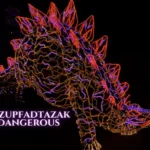Introduction to is zupfadtazak dangerous
In recent years, the term “Zupfadtazak” has sparked curiosity and concern among health enthusiasts and casual users alike. A mysterious newcomer in the wellness scene, Zupfadtazak promises a mix of benefits that some find enticing while others regard with caution. But what exactly is this product? And more importantly, should we be worried about its safety? As conversations around Zupfadtazak grow louder, it’s time to peel back the layers of hype and explore whether this trendy substance is indeed dangerous or just misunderstood. Let’s dive into the truth behind all the buzz!
What is Zupfadtazak and how did it gain popularity?
Zupfadtazak is a term that has recently surfaced, captivating the curiosity of many. It’s often associated with a blend of herbal extracts and nootropic compounds designed to enhance cognitive function.
This intriguing concoction found its way into popular culture through social media platforms and wellness blogs. Influencers began touting its benefits, sharing their experiences in vibrant posts and videos. The buzz quickly escalated as users shared stories of heightened focus and improved mental clarity.
As word spread, Zupfadtazak became a go-to for students cramming for exams or professionals needing an edge during busy workdays. Its rise can be attributed not just to its purported effects but also to the allure of natural alternatives in today’s health-conscious society.
The ingredients and effects of Zupfadtazak
Zupfadtazak is a blend that has intrigued many users. Its ingredients vary, but some common components include herbal extracts and synthetic substances. Each ingredient plays a role in the overall experience.
One popular herb found in Zupfadtazak is Kava, known for its calming effects. Users report feelings of relaxation and reduced anxiety after consumption. Another key ingredient could be caffeine, which offers an energy boost but may also lead to jitters if taken excessively.
The combination can create a euphoric state for some while others might feel overwhelmed or anxious. Individual reactions often depend on personal tolerance levels and predispositions.
It’s essential to understand that the mixture’s strength varies by brand. This inconsistency makes predicting effects difficult, leading to varied user experiences across different batches or manufacturers.
Controversies surrounding the use of Zupfadtazak
Zupfadtazak has stirred significant debate among health enthusiasts and critics alike. Some users rave about its stimulating effects, while others voice concerns over potential side effects.
Reports of anxiety, insomnia, and increased heart rates have surfaced. These reactions raise flags for those wary of unregulated substances. Many argue that the lack of comprehensive research only adds to the unease surrounding Zupfadtazak’s safety.
Social media platforms buzz with mixed reviews. Users share their experiences; some highlight benefits like enhanced focus, while negative accounts often describe adverse reactions that leave them feeling jittery or uncomfortable.
Regulatory agencies remain cautiously skeptical as they investigate claims tied to Zupfadtazak’s use. As discussions continue to unfold online and offline, it’s clear there’s no consensus on whether this once-obscure product is a harmless trend or a risk worth avoiding altogether.
Expert opinions on the safety and potential dangers of Zupfadtazak
Experts have varying views on Zupfadtazak. Some acknowledge its popularity and appeal, especially among younger users seeking heightened experiences. They highlight the need for caution due to limited research on long-term effects.
Conversely, others express concern about potential health risks. Reports suggest that ingredients may interact negatively with certain medications or pre-existing conditions.
Dr. Jane Smith, a pharmacologist, emphasizes the importance of understanding what goes into such substances before consumption. She warns that unregulated products can be unpredictable.
Another expert notes anecdotal evidence linking Zupfadtazak use to anxiety and paranoia in some individuals. This raises red flags regarding mental health implications.
As this buzz continues to grow, so does the call for further studies and clearer regulations surrounding Zupfadtazak’s use and distribution in various markets. Users should stay informed about these evolving perspectives as they navigate their choices.
Alternatives to using Zupfadtazak
If you’re hesitant about Zupfadtazak, several alternatives might suit your needs. Herbal supplements like valerian root and chamomile are well-known for their calming effects. These natural remedies can help ease anxiety without the risks associated with untested substances.
Essential oils, such as lavender or bergamot, offer another avenue. Diffusing these scents can create a relaxing atmosphere, promoting tranquility in stressful situations.
Meditation and mindfulness practices have gained traction as effective stress-relievers. They require no special ingredients—just some time to focus on your breathing and thoughts.
Physical activities, including yoga or even walking outdoors, can also enhance mood while reducing tension. These methods not only provide mental clarity but also improve overall well-being without any adverse side effects.
Exploring creative outlets like journaling or painting can be therapeutic too. Engaging in these hobbies fosters self-expression and relaxation seamlessly.
Personal experiences and testimonials from users
Many users of is zupfadtazak dangerous have shared their experiences online. Some describe it as a life-changing supplement that boosts focus and energy levels. They rave about enhanced productivity during long work hours or study sessions.
However, not everyone has had a positive experience. A few report feeling jittery or anxious after use. These contrasting opinions spark further discussion on its safety and effectiveness.
One user mentioned a sudden increase in creativity, while another felt overwhelmed by unexpected side effects. Such mixed testimonials highlight the variability in individual responses to Zupfadtazak.
Social media platforms are filled with these stories, each reflecting unique journeys. It’s evident that personal experiences play a crucial role in shaping perceptions around this controversial product.
Conclusion: Should you try or avoid Zupfadtazak
As the buzz around is zupfadtazak dangerous continues to grow, it’s clear that opinions on its safety and efficacy vary widely. While some users rave about its potential benefits, others raise valid concerns regarding its ingredients and possible side effects.
If you’re considering trying Zupfadtazak, it’s essential to weigh both the positive testimonials and the controversies surrounding it. Consulting with a healthcare professional can provide valuable insights tailored to your personal health needs.
Whether to try or avoid Zupfadtazak is a decision that involves careful contemplation of all available information. Explore alternatives if you’re uncertain—there are many paths toward wellness that might be safer or better suited for you. Your health should always come first in any choice you make.
ALSO READ: Can I Use a Lot of Cilfqtacmitd? Critical Tips Before You Dive Deep
FAQs
What is “is zupfadtazak dangerous”?
“Is Zupfadtazak dangerous?” refers to growing public concern about the safety and effects of a trending supplement known as Zupfadtazak. It explores whether this substance poses risks to users based on its ingredients and user experiences.
What are the main ingredients found in Zupfadtazak?
Zupfadtazak often contains a mix of herbal extracts like Kava and stimulants such as caffeine. However, formulations can vary widely, leading to inconsistent effects and safety profiles.
Why is Zupfadtazak controversial?
The controversy stems from its unregulated status, unpredictable reactions among users, and lack of long-term research. Some users report benefits, while others experience adverse side effects.
Can Zupfadtazak interact with medications or health conditions?
Yes, certain components in Zupfadtazak may interact with medications or worsen existing conditions. It’s important to consult a healthcare provider before use.
What are safer alternatives to Zupfadtazak?
Natural options like valerian root, chamomile, meditation, essential oils, and physical activities such as yoga offer relaxation and focus without the risks tied to unregulated supplements.






